This morning started early with a BINGO (business and industry NGO constituency) meeting, where delegates shared their understanding and experiences to date on the various negotiating issues and events. This is a key benefit of being at the COP as there are so many issues being explored and discussed simultaneously that it’s not possible to be across everything at the same time. We also heard from the International Chamber of Commerce (ICC) Secretary General, John Denton (an Aussie) on the importance of the private sector especially at COP27.

Week 1 Wednesday at the COP is generally consumed by negotiators frantically drafting text on all 173 issues listed on the various agendas; this is typically done in meetings called ‘informals’ or ‘informal informals’ or “contact groups”. The contact groups then refer their recommended text (after hours of "horse-trading" between the Parties) to the COP Presidency for consideration and decision by the various decision making bodies (referred to as ‘COP’ for the Convention, ‘CMA’ for the Kyoto Protocol and ‘CMA’ for Paris Agreement) by close of business Friday.
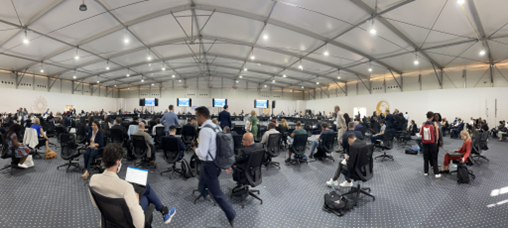
This typically means for some agendas, negotiators will continue contextualising the issues into legal recommendations well into Saturday and perhaps even into early next week if need be.
It's not clear at this stage what the sticking points will be, but inevitably insufficient pledges to climate finance, loss and damage (the term 'compensation' seems to be creeping into conversations), the nature of formal linkages if any between the Technology Mechanism and the Finance Mechanism, and the adoption of a global adaptation goal to name a few.

Indeed, while Articles 6.2/6.4 (carbon markets) were the rockstar issues of COP26 (re. finalising the Paris Agreement rule book), they seem to be taking a back seat here at COP27 to agendas like adaptation and interestingly non-state sector transparency (read as holding to account and avoiding so-called 'greenwashing' with their pledges); this might be considered a good thing for Article 6 as its focus turns to implementation.
In what has been an evolving recognition by the UNFCCC for the role that non-state actors (private sector and NGOs) must play in ensuring the goals of the Paris Agreement are achieved, arising from the leaders summit hosted at the beginning of the COP was the publication of the High-Level Expert Group on the Net-Zero Emissions Commitments of Non-State Entities report (see link).
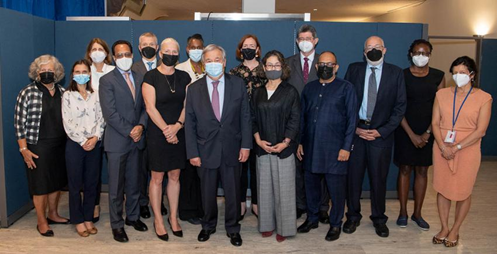
By COB Friday, we will essentially see the conclusion of the work of the two Subsidiary Bodies for Scientific and Technological Advice (SBSTA) and Implementation (SBI); with any issues lacking a consensus by Parties being referred by the Presidency for political stewardship by ministers and heads of state who will start to arrive next Monday.
So far the three key high-level issues that seem to occupy much of the corridor chatter include: no "backsliding" on national commitments (India is showing signs of vulnerability in this regard), nations living up to their promises including on climate finance (the main cause of a deficit of trust between developing and developed nations), and removing the barriers to implementation within the already established UN frameworks including carbon markets (focus on implementation and outcomes).
Also at the COP today were John Kerry and Al Gore announcing the Energy Transition Accelerator and presenting on Climate TRACE (respectively).
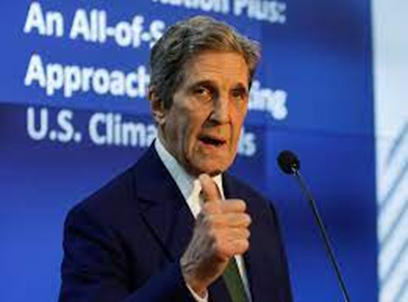
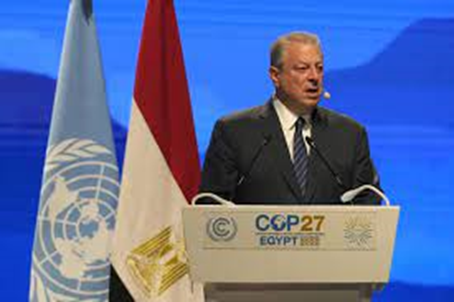
I also held interesting discussions with very many delegates on the need for the UNFCCC agendas to be viewed through the lens of engineering and economics, including (but not exclusive) the CEO CEFC, Board member of ASHRAE (American Society of Heating, Refrigerating and Air-Conditioning Engineers), Exec Director Worley, Director WSO, Head Climate KPMG (I was kindly invited to their reception), President of US BCSE, UNFCCC secretariat, CEO of IEAGHGT, Senior Manager of United Nations Foundation, a Saudi Arabia official on EVs, H2 and Neom’s (The Line) to list a few.
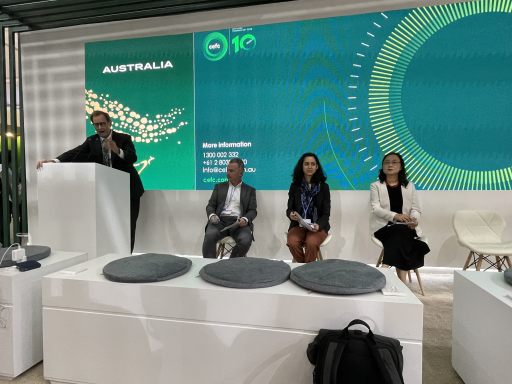
Ian Learmonth, CEO CEFC at the Australian Pavilion
And I also hope to have a coffee with Australia's new Climate Ambassador this week.
I also attended an ISO event on the convening power of standards. The ISO will launch their Our 2050 World initiative’s “The Net Zero Guidelines” here at the COP on Friday, 11th of November (see link).

Also of interest to members will be an event that WFEO, IEEE, EIC-ICI will co-host at 830p (AEDT; Sydney) titled "The global engineering view: Delivering an equitable, sustainable and low carbon resilient world". As a formal UNFCCC event, it will be live streamed via this link.